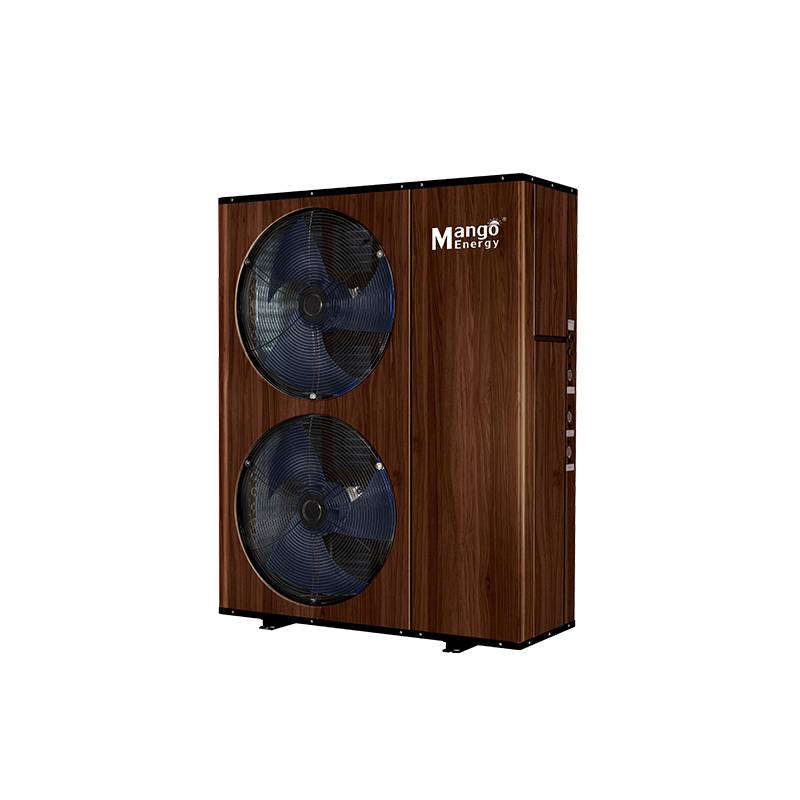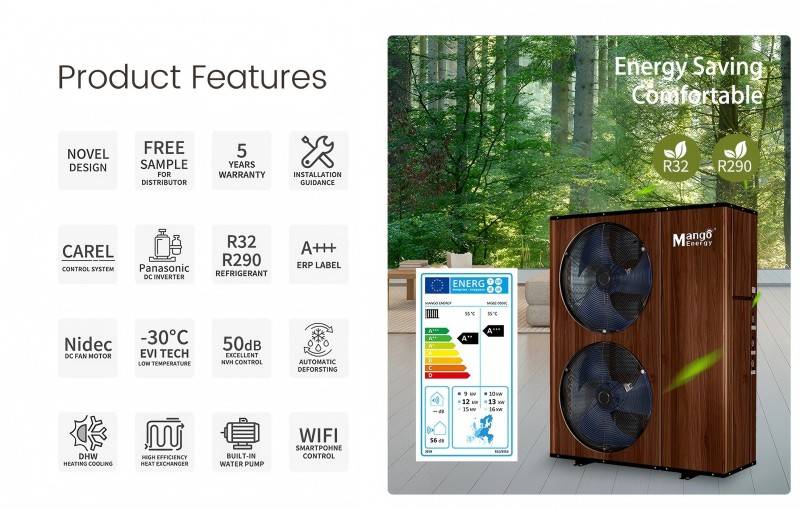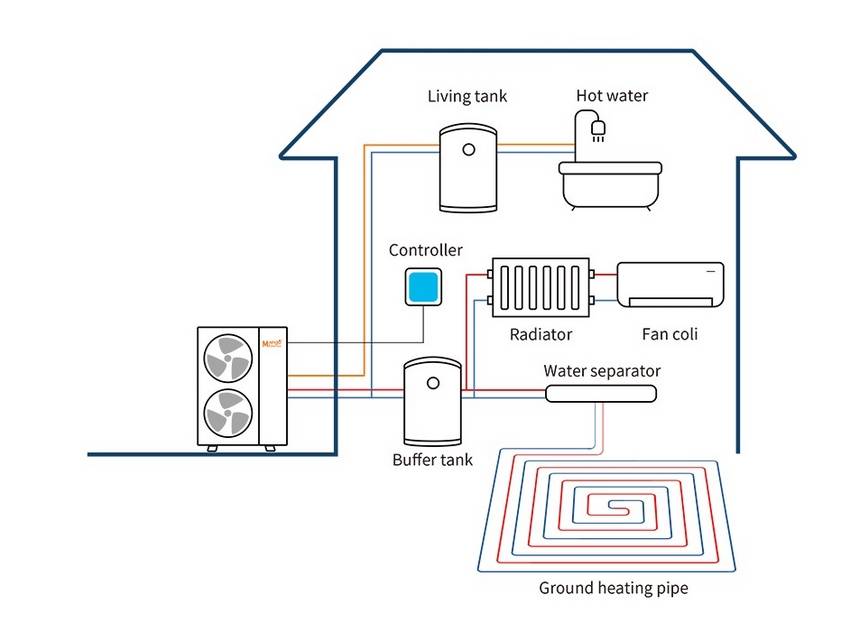
One technology that has gained widespread attention in the HVAC industry is the Monoblock DC Inverter Heat Pump. These systems offer impressive energy efficiency and versatile functionality, making them a popular choice for both residential and commercial applications. But how efficient are they, really? In this article, we’ll dive into the details of monoblock DC inverter heat pumps, explore how they compare to other systems, and explain why they are considered a top choice for heating and cooling.
What is a Monoblock DC Inverter Heat Pump?
To understand the efficiency of monoblock DC inverter heat pumps, it’s important to first define what these systems are. A monoblock heat pump system is a type of air-source heat pump that integrates all the essential components—compressor, evaporator, condenser, expansion valve, and refrigerant—into a single unit. Unlike traditional heat pump systems, which have separate indoor and outdoor components, the monoblock DC inverter heat pump is a self-contained unit that is typically installed outdoors. DC Inverter technology refers to the advanced inverter-driven compressor used in the system. Unlike conventional compressors, which operate at a fixed speed, an inverter compressor can adjust its speed and output to meet the precise heating or cooling demand, thereby improving efficiency. This flexibility ensures that the DC inverter heat pump for home can optimize energy usage according to the changing environmental conditions, leading to substantial energy savings.

The Efficiency of a Monoblock DC Inverter Heat Pump
The efficiency of a monoblock DC inverter heat pump is primarily determined by two factors: the Coefficient of Performance (COP) and the Seasonal Performance Factor (SPF). Both of these metrics help to evaluate the heat pump’s ability to convert electrical energy into usable heat or cool air.

1. Coefficient of Performance (COP)
The COP is a measure of how efficiently a heat pump can transfer heat. It represents the ratio of heat output to electrical input, meaning the higher the COP, the more heat is generated for every unit of electricity consumed. For example, a COP of 4 means that for every 1 kW of electricity, the system produces 4 kW of heating power.
A monoblock DC inverter heat pump typically achieves higher COP values compared to traditional heat pumps because of its ability to modulate compressor speed. DC inverter air source heat pumps, such as those offered by leading manufacturers, can achieve COP values ranging from 3 to 5 depending on factors like ambient temperature and system size. This makes them an efficient alternative to traditional electric heating methods.
2. Seasonal Performance Factor (SPF)
While the COP measures the efficiency of a heat pump at a specific moment, the SPF measures its efficiency over the course of an entire heating or cooling season. Since the monoblock heat pump system is capable of adjusting its operation according to demand, it can significantly reduce the energy required during periods of mild weather.
The SPF of a monoblock DC inverter heat pump can be up to 4 or even higher, depending on the system and local climate. For homes in areas with milder winters or summers, the DC inverter heat pump for home can operate efficiently with minimal energy consumption, further increasing its seasonal efficiency. The ability to run at partial load means less frequent cycling on and off, reducing energy losses that typically occur with traditional heating systems.

Energy Savings and Environmental Impact
One of the key advantages of a monoblock DC inverter heat pump is its ability to save energy while minimizing environmental impact. Traditional electric heating systems, such as electric resistance heaters, convert electricity directly into heat, but they are highly inefficient, often requiring several units of electricity to generate just one unit of heat. In contrast, a DC inverter air source heat pump can deliver multiple units of heat for every unit of electricity it consumes, making it a highly energy-efficient solution.According to various studies, monoblock DC inverter heat pumps can reduce energy consumption by up to 50-70% compared to traditional heating methods, especially when used for both heating and cooling. This reduction in energy use translates into lower utility bills and a smaller carbon footprint, making them an environmentally friendly choice.For homeowners and businesses looking to reduce their energy costs and environmental impact, installing a monoblock heat pump system can be a significant step in the right direction.
How Does a Monoblock DC Inverter Heat Pump Compare to Other Systems?
While monoblock DC inverter heat pumps are known for their efficiency, it’s helpful to compare them with other popular heating and cooling systems to understand their true potential.
1. Monoblock DC Inverter Heat Pump vs. Traditional Air Source Heat Pumps
Traditional air-source heat pumps rely on two separate units: an outdoor compressor and an indoor air handling unit. These systems are generally less efficient than monoblock DC inverter heat pumps because they cannot adjust the speed of the compressor. They also tend to have higher standby energy consumption, as they continuously cycle on and off. In contrast, monoblock DC inverter heat pumps operate more efficiently, with the ability to maintain a constant temperature and avoid energy waste.
2. Monoblock DC Inverter Heat Pump vs. Gas Heating Systems
Gas heating systems are commonly used in colder climates due to their powerful heating capacity. However, they are less efficient than monoblock DC inverter heat pumps, which use electricity (often sourced from renewable energy) to generate heat. DC inverter heat pumps can provide both heating and cooling, while gas systems are limited to heating. Additionally, the environmental impact of gas heating is much higher due to carbon emissions. In comparison, monoblock heat pump systems offer a greener and more sustainable option.
3. Monoblock DC Inverter Heat Pump vs. Electric Resistance Heating
Electric resistance heating is one of the least efficient methods of heating, as it typically requires 1 kW of electricity to produce 1 kW of heat. On the other hand, a monoblock DC inverter heat pump can provide multiple units of heat for each unit of electricity consumed, making it far more efficient and cost-effective. For homeowners seeking to lower their electricity bills, a DC inverter heat pump for home can be a much more affordable and energy-efficient alternative.
Conclusion:
A monoblock DC inverter heat pump stands out as one of the most efficient, versatile, and environmentally friendly heating and cooling solutions available today. Its ability to adapt to varying heating and cooling demands through the use of DC inverter technology allows it to achieve exceptional energy efficiency, with COP values ranging from 3 to 5 and SPF values often exceeding 4. This translates into lower energy consumption, reduced utility bills, and a smaller carbon footprint.When compared to traditional heating and cooling systems, monoblock DC inverter heat pumps offer clear advantages in terms of efficiency, flexibility, and environmental impact. Whether you’re looking to install a monoblock heat pump system for residential or commercial use, this technology is a wise investment for both the wallet and the planet.


